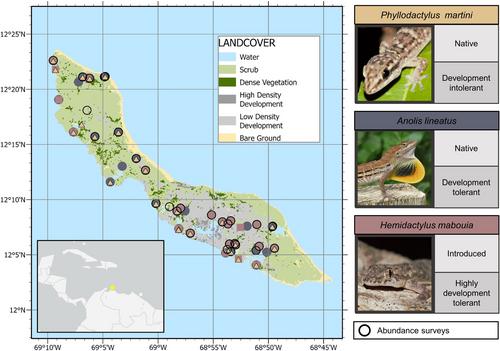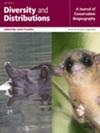Dispersal restriction and facilitation in species with differing tolerance to development: A landscape genetics study of native and introduced lizards
Abstract
Aim
The development of natural habitats into urban land uses has greatly accelerated in the recent past due to human activities. This habitat development disrupts species' natural dispersal processes and can lead to both direct and indirect impacts on dispersal. Whether human activities result in restricted or facilitated dispersal may depend on a species' development tolerance; however, this premise has not been tested. We examined the impact of urbanization and road networks on the dispersal of three lizard species in the context of their development tolerance.
Location
Curaçao.
Methods
To quantify species' development tolerance, we modelled three lizard species abundances at sites based on surrounding landscape development. Using microsatellite genotypes, we conducted individual-based resistance surface analyses and modelled the effect of habitat development on genetic admixture to assess indirect dispersal restriction and facilitation. We explored direct facilitation of dispersal using network analysis of mitochondrial haplotypes.
Results
Phyllodactylus martini, a native gecko species, was the least tolerant of development and experienced indirect dispersal restriction due to roads, according to resistance surface analyses. Anolis lineatus, a native anole species, exhibited a neutral relationship with development. Resistance surfaces and Structure analyses showed that A. lineatus faced indirect dispersal restrictions from roads and developed areas, while mitochondrial haplotype networks suggested they benefited from occasional human-facilitated long-distance dispersal events. Hemidactylus mabouia, an introduced gecko species, was the most tolerant of development, and experienced no dispersal restriction, but mitochondrial haplotypes suggest direct long-distance dispersal facilitation.
Main Conclusions
Our findings highlight development tolerance as a key predictor of dispersal impact for these species and future work should test whether these patterns are upheld in other systems. Understanding how human activities affect species' dispersal will aid in managing introduced species while promoting connectivity for native species navigating dispersal challenges in dynamic landscapes.


 求助内容:
求助内容: 应助结果提醒方式:
应助结果提醒方式:


